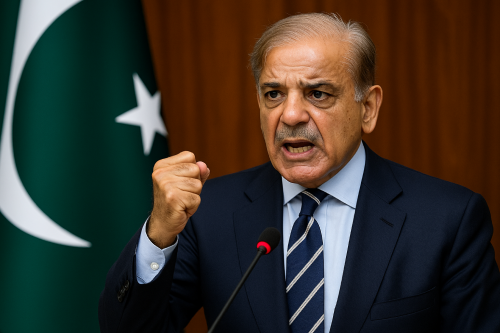Kashmir Crisis Live: Pakistan PM Vows Consequences for India’s ‘Cowardly’ Attack

Kashmir Crisis Live: Pakistan PM Vows Consequences for India's 'Cowardly' Attack
Tensions between India and Pakistan have escalated sharply following India’s recent airstrikes on Pakistani territory. Pakistan’s Prime Minister, Shehbaz Sharif, has condemned the attacks as “cowardly” and vowed that India must “suffer the consequences.” The international community watches with growing concern as the two nuclear-armed neighbors edge closer to a potential full-scale conflict.
Background: The Pahalgam Attack
On April 22, 2025, a terrorist attack in the Baisaran Valley near Pahalgam, Indian-administered Kashmir, resulted in the deaths of 27 individuals, including 25 Hindu tourists, a Christian tourist, and a local Muslim. The Resistance Front (TRF), believed to be an offshoot of the Pakistan-based, UN-designated terrorist group Lashkar-e-Taiba, claimed responsibility for the attack. Eyewitnesses reported that the assailants specifically targeted non-Muslims, further inflaming communal tensions.
India’s Response: Operation Sindoor
In retaliation, India launched “Operation Sindoor” on May 7, 2025, targeting what it described as terrorist infrastructure in Pakistan and Pakistan-administered Kashmir. The Indian military claimed that the strikes focused on facilities linked to Lashkar-e-Taiba and Jaish-e-Mohammed, both UN-designated terrorist organizations. Key targets included locations in Bahawalpur, Muridke, and other areas known to harbor militant activities.
Pakistan’s Reaction: Condemnation and Retaliation
Pakistan vehemently condemned the Indian airstrikes, labeling them as unprovoked aggression and an “act of war.” Prime Minister Shehbaz Sharif asserted that India must “suffer the consequences” for its actions. Pakistan reported that the strikes resulted in the deaths of at least 26 civilians, including children, and injured 46 others. In response, Pakistan claimed to have shot down five Indian fighter jets and authorized its military for corresponding actions, while emphasizing a desire to avoid full-scale war.
Escalation Along the Line of Control
Following the airstrikes, cross-border shelling intensified along the Line of Control (LoC), leading to additional civilian casualties on both sides. Reports indicate that at least seven Indian civilians were killed due to Pakistani retaliatory shelling. The situation remains volatile, with both nations mobilizing military forces near the border.
International Calls for Restraint
The international community has expressed deep concern over the escalating tensions. Leaders from the United Nations, United States, United Kingdom, China, Russia, and Turkey have urged both India and Pakistan to exercise restraint and engage in diplomatic dialogue to de-escalate the situation. The risk of conflict between two nuclear-armed nations has prompted widespread calls for immediate action to prevent further deterioration.
Conclusion: A Delicate Crossroads
The Kashmir crisis has once again brought India and Pakistan to a precarious juncture. With both nations holding firm to their positions and the potential for further military engagement looming, the path forward remains uncertain. The international community’s role in mediating and facilitating dialogue will be crucial in averting a larger conflict and ensuring regional stability.





